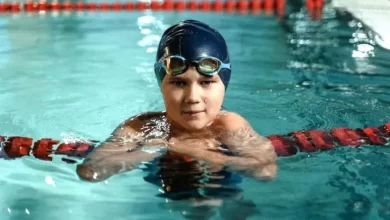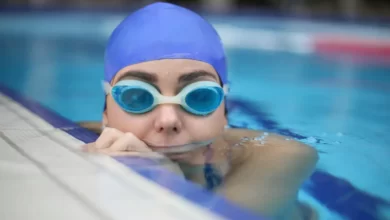10 Essential Tips for Baby Swimming Lessons: What Not to Skip
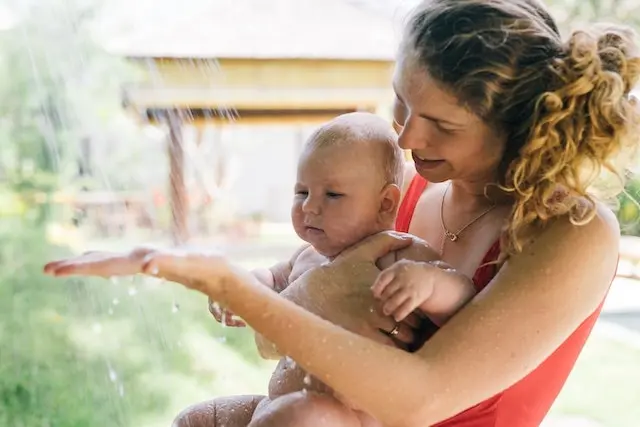
As a parent or caregiver, you want the best for your child. Right! So introduce them to the joy of swimming. Baby swimming lesson is both exciting and beneficial. We will walk through every aspect of a baby swimming lesson. From understanding the benefits of swimming and choosing the right swim school to preparing for lessons, ensuring safety, and witnessing your baby’s progression. Have fun in the water with your little buddy.
In this article,
Why are baby swim lessons important?
Baby swim lessons offer various benefits beyond the fun of splashing in the water. It boosts physical development, strengthens muscles, improves coordination, and elevates cognitive skills. Moreover, baby swimming lessons develop water confidence. Which is vital for your baby’s safety around water in the future. Research has shown that early exposure to water and swimming can lead to a reduced risk of drowning and improved aquatic skills later in life. Additionally, the positive sensory experiences in the water can stimulate your baby’s brain and contribute to their overall development.
What age is ideal to start baby swimming lessons?
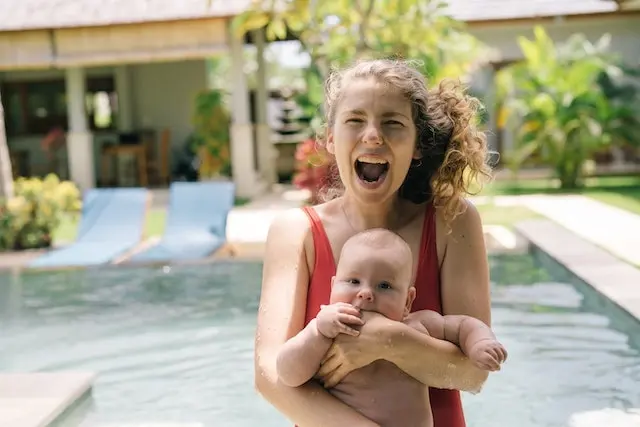
The right age to start baby swimming is around 6 months and above when babies have better head control and can respond positively to the water. However, some swim schools offer classes for younger infants as well. Always consult with your paediatrician before starting baby swimming lessons to ensure it is safe for your child. Starting early can help your baby become familiar with water, making them more comfortable and confident as they grow. However, remember that every child is unique, and some babies may need more time to become habituated to the water.
How do I choose the right swim school?
Choosing the right swimming school is vital for a positive experience. Look for schools that offer specialized infant aquatic programs, have certified instructors, and maintain a clean and safe pool environment. Reading online reviews and testimonials from other parents can give valuable insights into the swim school’s reputation and the quality of its classes. Visiting the swim school beforehand and observing a class can also give you a sense of their teaching style and facilities. Ask questions about the instructor’s experience with infants, the class size, and the safety measures in place to ensure a comfortable and safe learning environment for your little one.
What should I bring to a baby swim lesson?
Being well-prepared is essential for a smooth and enjoyable baby swimming lesson. Here is a checklist of items to bring:
- Swim diapers: Most swim schools require babies to wear swim diapers to prevent accidents in the pool.
- Swimwear: Choose comfortable and age-appropriate swimwear that allows easy movement.
- Towels: Bring a couple of soft, absorbent towels to dry your baby after the lesson.
- Sunscreen: Protect your baby’s delicate skin from the sun with a baby-friendly sunscreen.
- Extra clothes: Have a change of clothes for your baby and yourself, as well as a plastic bag for wet items.
- Snacks and water: Keep your little one hydrated and energized with some snacks and water during breaks.
- Swim hat and swim goggles: While not essential, these items can provide added protection and comfort for your baby in the water.
How do baby swimming lessons usually begin?

Baby swimming lessons typically start with a water introduction and familiarization. The first few lessons are designed to get your baby comfortable with the environment. The instructor may use games, songs, and gentle movements to help your baby feel at ease. Holding your baby close and maintaining eye contact during these initial sessions can provide a sense of security. The lesson often takes place in a shallow, warm water pool to ensure a pleasant experience for your baby.
What types of activities are included in baby swimming lessons?
Baby swimming lessons incorporate a variety of fun and engaging activities to stimulate your baby’s interest and build water confidence. These activities include:
- Nursery rhymes and songs: Singing familiar nursery rhymes while gently moving your baby through the water can create a positive and enjoyable experience.
- Floating on the back: The instructor may guide your baby to float on their back with support to help them relax and feel buoyant.
- Blowing bubbles: Blowing bubbles in the water can be both entertaining and beneficial, as it introduces your baby to the sensation of water on their face.
- Playing with floating toys: Floating toys, like rubber ducks or softballs, encourage your baby to reach out and explore the water around them.
- Gentle submersion: The instructor may introduce gentle submersion activities where your baby’s face is briefly and safely submerged in the water. This helps your baby become accustomed to the sensation and prepares them for more advanced skills later on.
How can I ensure my baby’s safety during swim lessons?
Safety is of utmost importance during baby swimming lessons. Always stay within arm’s reach of your baby in the water, providing constant supervision. Follow the instructor’s guidance and never force your baby to do something they are not comfortable with. If your baby is feeling overwhelmed, take breaks and let them ease back into the activities. Keep the pool area secure, and always adhere to the swim school’s safety protocols. Additionally, ensure that your baby is wearing the appropriate swim gear, such as a well-fitting swim diaper, to prevent any accidents in the water.
What progression can I expect in my baby’s swimming skills?
Baby swimming lessons follow a step-by-step progression tailored to your baby’s development and comfort level. Each lesson builds on the skills learned in the previous session. Initially, your baby will become more familiar with the water environment, learn to kick and splash, and gradually gain more confidence in the water. As your baby becomes more comfortable, the instructor may introduce gentle submersion techniques, encouraging breath control and floating. Over time, your baby may progress to more advanced skills like kicking while holding onto the pool edge or floating on their back with minimal support. Each baby is unique, and the pace of progression will vary with minimal support. With each encouraging word, your baby’s swimming skills will improve.
How does parent-baby bonding play a role in baby swim lessons?
Baby swimming lessons provide a unique bonding opportunity between you and your baby. The close physical contact, gentle interaction, and shared experiences in the water strengthen your emotional connection and create lasting memories. Engaging in water play together fosters trust and enhances your relationship outside of the swimming pool. The bond formed during these lessons can extend beyond the pool and positively influence your baby’s social and emotional development.
What can I do to support my baby’s progress outside of the lesson?
Supporting your baby’s progress outside of swimming lessons is essential for their continued development. Here are some tips to enhance their water confidence:
- Water play at home: Incorporate water play into your daily routines, such as bathtime. Let your baby splash and play in the water to become more comfortable with the sensation.
- Sing water-related songs: Singing songs about swimming or water during bath time or play time can create positive associations with water.
- Positive reinforcement: Celebrate your baby’s achievements and efforts during swimming lessons. Praise and encouragement go a long way in boosting their confidence.
- Be patient: Remember that every baby progresses at their own pace. Be patient and supportive, allowing your baby to explore the water environment at their comfort level.
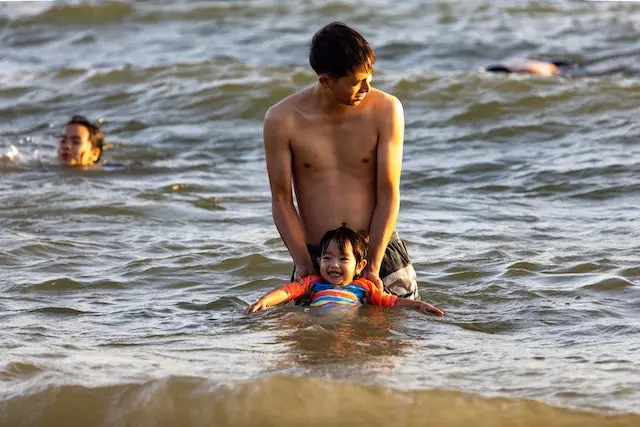
Conclusion:
Embrace the wonders of baby swimming lessons, and may this experience be filled with joy, learning, and beautiful memories for both you and your baby, Witness your little swimmer’s progression and celebrate each milestone achieved during their aquatic journey!
How do I prepare my baby for their first swimming lesson?
Getting ready with your baby for their first swimming lesson is crucial for a positive experience. Start by selecting a comfortable and well-fitting swim diaper and swimwear. Pack a bag with important things like towels, extra clothes, snacks, and water. Before the lesson, make sure your baby is well-rested and has had a light meal. Engage in calm and positive interactions, so your baby feels relaxed, comfortable, and excited about the upcoming adventure.
What safety measures should I prioritize during baby swimming lessons?
Security should always be the first concern during baby swimming lessons. First and foremost, choose a reputable swim school with certified instructors who specialize in infant swim programs. Ensure that the pool environment is clean and well-maintained. While in the water, never leave your baby alone and stay within arm’s reach at all times. Follow the instructor’s guidance and never force your baby into activities they’re not comfortable with.

